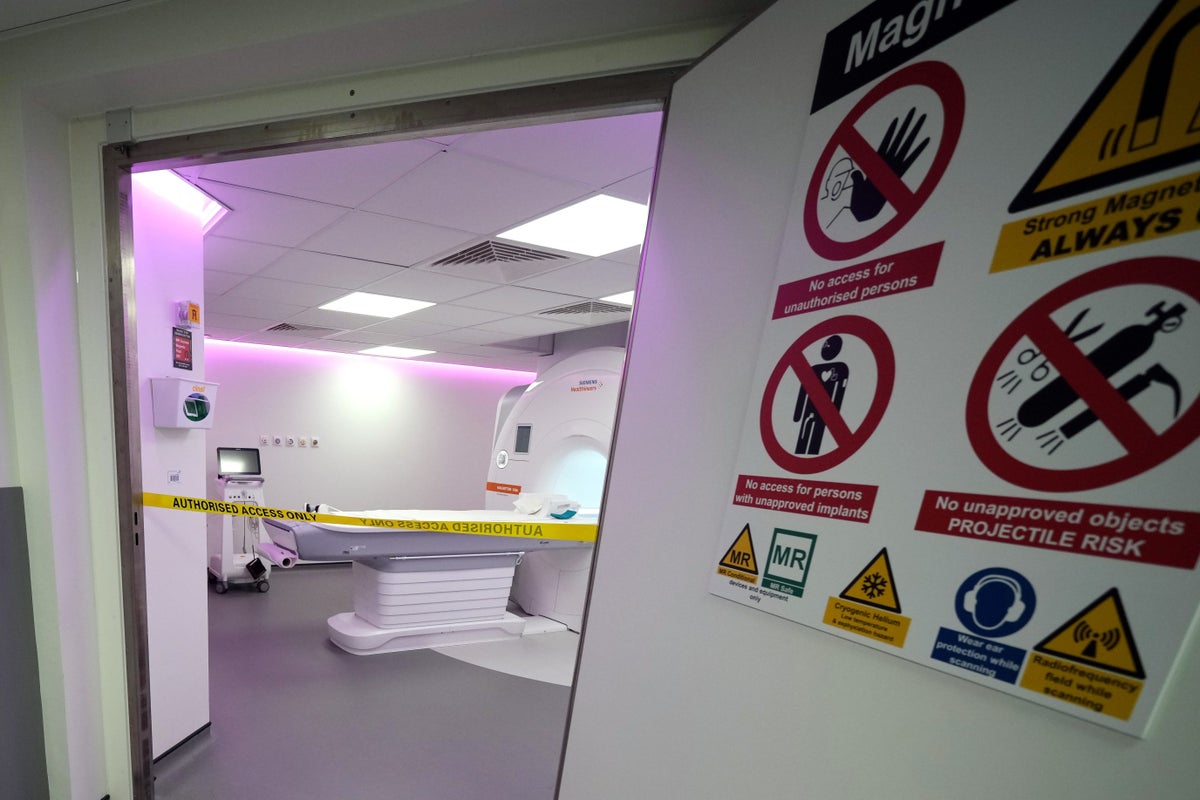For free real time breaking news alerts sent straight to your inbox sign up to our breaking news emails
Sign up to our free breaking news emails
Using MRI scans to screen men for prostate cancer could reduce deaths from the disease “significantly”, researchers have suggested.
Scientists said current tests, which detect the level of the protein prostate-specific antigen (PSA) in the blood, have been linked to over-diagnosis and over-treatment of low-risk cancer.
Prostate cancer is the most common cancer found in men and, at the moment, those aged over 50 can request a PSA test if they are experiencing symptoms.
The Reimagine study invited 303 men aged between 50 and 75 to have a screening MRI and a PSA test.
Of the total, 48 (16%) had an MRI that indicated the presence of prostate cancer despite having a median PSA density.
Recommended
- Charity boss speaks out over ‘traumatic’ encounter with royal aide
- Ukraine war’s heaviest fight rages in east – follow live
Of the group, 32 had lower PSA levels than the current screening benchmark of 3ng/ml, meaning they would not have been referred for further investigation.
After NHS assessment, 29 men were diagnosed with cancer that required treatment, 15 of whom had serious cancer and a PSA of less than 3ng/ml.
Three men (1%) were diagnosed with low-risk cancer that did not require treatment.
Our results give an early indication that MRI could offer a more reliable method of detecting potentially serious cancers early
Prof Caroline Moore
The study was led by University College London, University College London Hospitals NHS Foundation Trust and King’s College London and is published in medical journal BMJ Oncology.
Prof Caroline Moore, consultant surgeon at UCLH, chief investigator of the study and NIHR research professor, said the findings are “sobering” and “reiterates the need to consider a new approach to prostate cancer screening”.
“Our results give an early indication that MRI could offer a more reliable method of detecting potentially serious cancers early, with the added benefit that less than 1% of participants were ‘over-diagnosed’ with low-risk disease,” she added.
Prof Mark Emberton, consultant urologist at UCLH, said: “The UK prostate cancer mortality rate is twice as high as in countries like the US or Spain because our levels of testing are much lower than other countries.
“Given how treatable prostate cancer is when caught early, I’m confident that a national screening programme will reduce the UK’s prostate cancer mortality rate significantly. There is a lot of work to be done to get us to that point, but I believe this will be possible within the next five to ten years.”
Nick James, a professor of prostate and bladder cancer research at the Institute of Cancer Research in London said the study “further reinforces the value of MRI in the diagnostic pathway for prostate cancer”.
“The well-known limitations of the old PSA-based screening studies of over- diagnosis and linked over-treatment are increasingly mitigated by the use of MRI,” he added.
“Similarly, MRI can also spot cases of prostate cancer in patients with normal PSA levels, who would have been missed using PSA only screening programmes.”
MRI scans have revolutionised the way we diagnose prostate cancer, and it’s great to see research into how we might use these scans even more effectively
Simon Grieveson, Prostate Cancer UK
Prof Sir Mike Richards, chairman of the UK National Screening Committee (NSC), said the organisation does not currently recommend prostate cancer screening “because there is no clear evidence that the benefits outweigh the harms”.
However, it is preparing to look at various proposals.
He added: “The UK NSC will soon commission a major piece of work to consider six prostate cancer screening proposals that were submitted during its annual call for topics.
“These include targeted and risk-stratified screening proposals for screening groups of men at higher risk due to factors such as ethnicity and family history.”
Simon Grieveson, assistant director of research at Prostate Cancer UK, said: “MRI scans have revolutionised the way we diagnose prostate cancer, and it’s great to see research into how we might use these scans even more effectively.
“These results are extremely exciting, and we now want to see much larger, UK-wide studies to understand if using MRI as the first step in getting tested could form the basis of a national screening programme.”
Another trial, known as Limit, is being conducted with a much larger number of patients, which the research team said is the “next step towards a national prostate screening programme”.
The trial will also attempt to recruit more black men, after the team behind Reimagine found they were much less likely to respond to the invitation to screening than others.
Recommended
- Bella Ramsey among stars supporting campaign for sustainable contract agreements
- School pupils call for peace year on from Olivia Pratt-Korbel’s death
- Eton given green light to open selective sixth forms in education ‘cold spots’
Saran Green of King’s College London said: “One in four black men will get prostate cancer during their lifetime, which is double the number of men from other ethnicities.
“Given this elevated risk, and the fact that black men were five times less likely to sign up for the Reimagine trial than white men, it will be crucial that any national screening programme includes strategies to reach black men and encourage more of them to come forward for testing.”
✕
Subscribe to Independent Premium to bookmark this article
Want to bookmark your favourite articles and stories to read or reference later? Start your Independent Premium subscription today.
SubscribeAlready subscribed? Log in
Popular videos
{{/link}}

